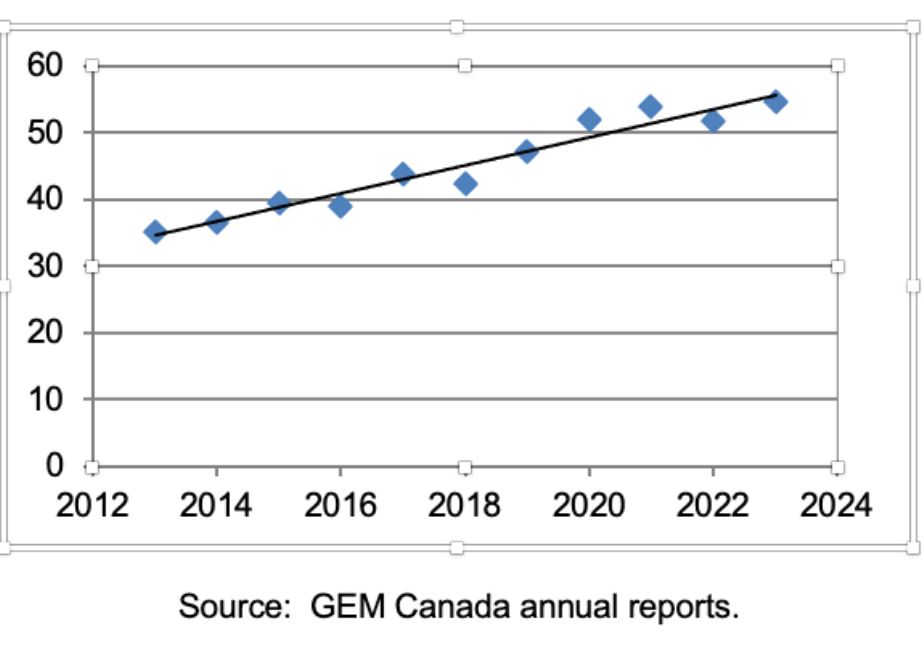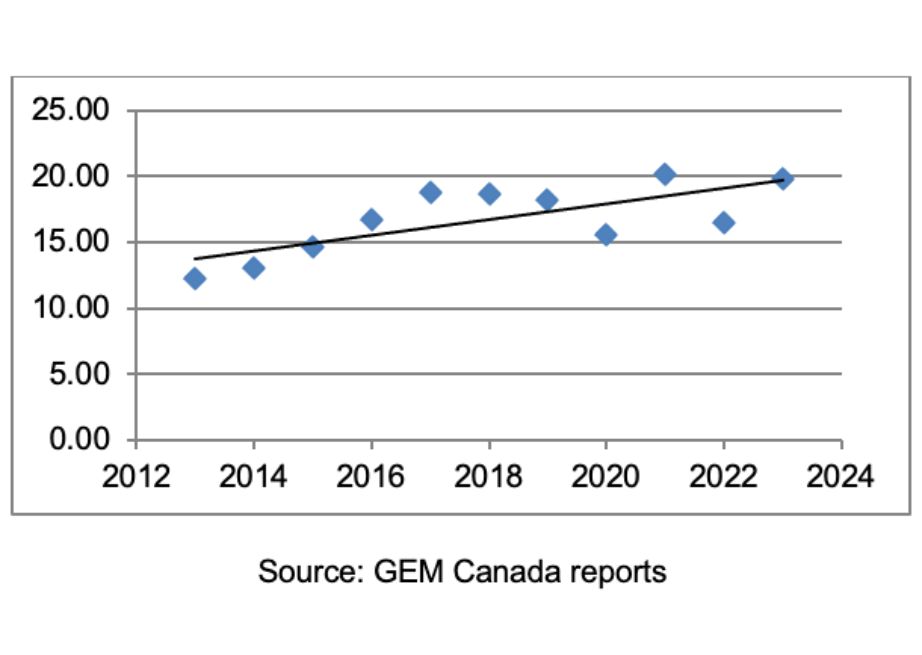By Peter Josty
Think about these intimidating numbers: 30% of new businesses fail in the first two years, 50% do not survive beyond five years and only one third survive to ten years. With knowledge of these numbers, it should come as no surprise that fear of failure is common when individuals consider starting a business.
On the surface, the term “fear of failure” could come across as a negative. But as this article highlights, increases in fear of failure don’t necessarily lead to a decline in start-up activity.
How Canada compares to other countries
According to the 2023 Global Entrepreneurship Monitor (GEM) report, 55% of Canadian adults said they would not start a business for fear it might fail. This number has been on the rise over the last decade.

We don’t understand the reasons behind this steady increase. COVID seems to have had a small effect in 2020 and 2021, but the trend started much earlier than that.
Canada is not alone in experiencing this fear of failure increase. Many other countries have seen a rise in fear of failure over this period. The rise in the UK has been almost identical to Canada.
Canada’s 55% fear of failure percentage in 2023 is ranked sixth highest among 46 countries in 2023. China’s percentage is 64.5%, India 62.8%, Saudi Arabia 60.8%, South Africa 59.5% and Romania 58.1%. The US has a smaller rate (45%), similar to the Canadian rate five years ago. The fear of failure rate in Canada increased by 55% in the last decade, while in the US it increased 46%. Because of this, the gap between Canada and the US has widened considerably in the last decade. In 2023, the gap was 4%; in 2023 it was 10%.
Rate of startups
The lowest fear of failure is found in Korea, where only 27% say they have a fear of failure that would prevent them from starting a business. However, Korea has a start-up rate about half that of Canada, so the fear of failure is clearly not directly related to start-up rates.
Rather paradoxically, over the last decade the rate of start-ups has increased steadily in Canada. The graph below shows Canada’s Total Early-stage entrepreneurship (TEA) rates: the percentage of the adult population actively trying to start a new company plus the percentage running a new company less than 3.5 years old.

Gender
Typically, women have a slightly higher fear of failure than men, by roughly 10% in 2021. There is debate about why this is the case.
Skills and opportunities
Despite the high level of fear of failure, 57% of Canadians say they have the knowledge, skills and experience required to start a business, and 63% say there are good opportunities to start a business in their area. These numbers are higher than in the US, where 49% of Americans say they have the knowledge skills and experience to start a business, and 54% see good opportunities.
What entrepreneurs say
In a study published in the Harvard Business Review, James Hayton and Gabrialla Cacciotti interviewed 65 entrepreneurs in the UK and Canada, asking about their fear of failure. The lean startup movement advocates failing “fast and often”. However, no one really wants to fail. Failure has many ramifications, including potential bankruptcy, repossession of workers’ homes, social stigma and people losing their livelihoods. They identified seven sources of fear:
- financial security
- ability to fund the venture
- personal ability/self-esteem
- potential of the idea
- threats to social esteem
- the venture’s ability to execute
- opportunity costs
They found that not all of these fears had the same effect. Fears relating to the potential of the idea and their personal ability to develop a successful venture inhibited their progress and led to lots of “paralysis by analysis”.
However, they found that many of the other fears actually led to more motivation and greater efforts to succeed. One entrepreneur was quoted as saying: “Fear pushes me to work harder, to take more care of what I am doing, and to educate myself to be the best I can as I am developing these businesses.”
The study revealed that entrepreneurs found a number of ways to mitigate fear of failure:
- A proactive, problem-solving response
- Learning and increasing one’s capabilities
- Reaching out to mentors and local communities
Conclusion
Uncertainty and ambiguity are defining features of entrepreneurship. Fear of failure is a normal part of this. While fear of failure has been rising in Canada, it has not prevented the rise in the rate of startups. Fear of failure can have both negative and positive effects.
Peter Josty is Head of the GEM Canada Team. The latest GEM Canada National Report is available at this link. An adapted version of this article was first published on the THECIS blog.

